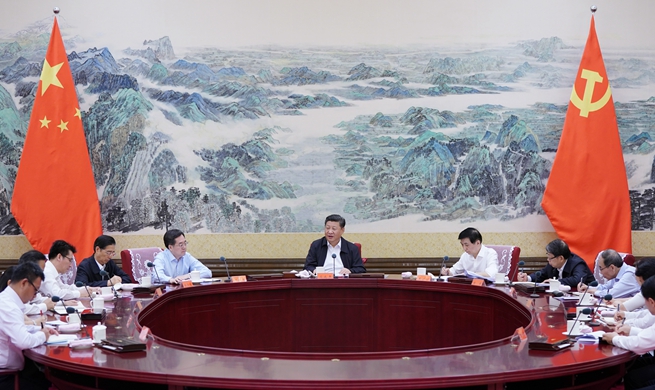BERLIN, July 3 (Xinhua) -- The ruling Christian Democratic Union (CDU) and Christian Social Union (CSU) parties have resolved their Cabinet conflict over German asylum policy, the two coalition partners announced on Monday night local time.
"We have reached an agreement following very intense negotiations between the CDU and CSU," Interior Minister and CSU leader Horst Seehofer told press after an emergency talk between senior representatives of the two conservative sister parties. Seehofer added that he would consequently be able to retain his Cabinet post in the federal government.
Earlier, the CDU and CSU had arrived at a widely-publicized impasse over the question of whether or not to turn back asylum seekers at the German border who were already registered in another Schengen Area country. While Seehofer wanted to refuse asylum seekers access to German territory if they had already formally entered the Schengen zone via another country, Merkel warned of a resulting domino effect as Germany's neighbors rush to shutter their internal borders.
In spite of the German chancellor's success in winning backing from European Union (EU) member states for a new and stricter joint asylum policy regime, Seehofer threatened to resign from all political offices as recently as Sunday unless Merkel endorsed the unilateral measures laid out in his "migration master plan".
The CDU and CSU have now found a compromise by agreeing to establish so-called transit centers on the German-Austrian borders to detain asylum seekers already registered in the EU, before arranging their transfer to the responsible EU member.
Both parties emphasized on Monday night that they would "not act unilaterally" in operating the transit centers and instead seek a close administrative cooperation with all countries affected. "In this fashion, we can preserve the spirit of partnership in the European Union and at the same time take a decisive step to control secondary migration (the movement of asylum seekers within the bloc)," Merkel said.
German stock markets reacted with relief at the solution, which was widely seen as ending speculation over a violent unravelling of the electoral alliance formed by the CDU and CSU, and in turn, the ruling "grand coalition" as a whole.
Having repeatedly criticized government infighting over the issue in recent weeks, it still remains unclear how the German Social Democrats (SPD) will react to the latest development.
The SPD already refused to support the erection of transit centers when it formed part of the previous "grand coalition" led by Merkel back in 2015. Nevertheless, party representatives told press after the CDU/CSU meeting on Monday night that they would thoroughly examine the asylum policy compromise reached in the coming days.











